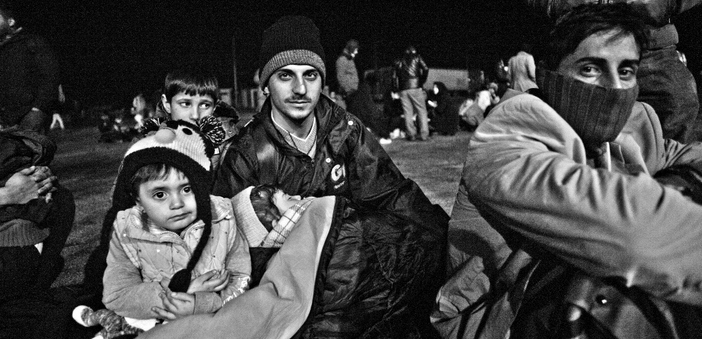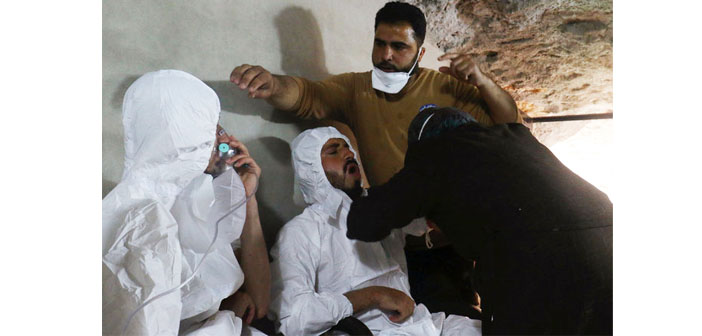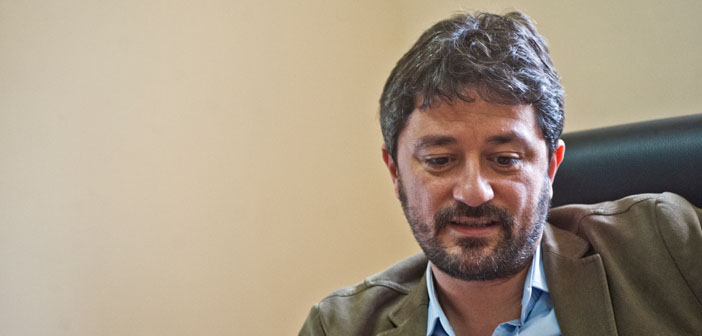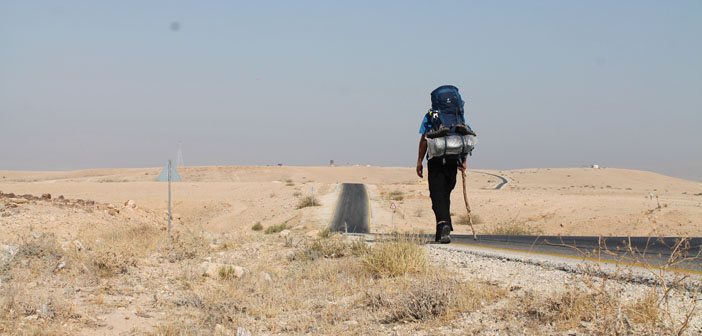Berge Arabian was on Mytlini and spent a day with the refugees there. He wrote and photographed their hopes, dreams and fears.
On the day I was on Lesbos, I was told that 13 rubber dinghies had arrived on the North-East shore of the island near Skala. On average, 25 to 40 refugees are sent in each of these dinghies by smugglers. They all come from the Turkish shores. Smugglers collect a lot of money from the refugees who are desperate to cross over to Greece. The first stop is Mytilini where the Red Cross helps to register them. They stay in the Kara Tepe or Moria camps. From there, they continue to Athens by ship. Then, busses take them to the Macedonian border where, if they are lucky, they will be let into Macedonia. From there, they usually go to Serbia, then Slovenia and then towards Austria.
I saw youth with their eyes saddened by the memory of mothers they left behind.
I saw young and old sitting for endless hours on the pier waiting for a ship that stubbornly refused to take them to the lands of their dreams.
I saw the pain on a penniless father's face when he asked his 3-year old if she wanted a piece of bread and her answer was ”I want some eggs.”
I saw ones from different continents greeting each other on the street. How long had they been stuck on this island together for this familiarity to be so easy?
I saw fathers with bundles and a sleeping child on their burdened shoulders.
I saw a little boy stuttering when I asked him if he got scared crossing the sea.
I saw the sadness of a man who heard that his family hadn’t got the chance to cross the sea yet once again for the third day in a row.
I saw Abu Walid paying for the 30-euro bus ticket for the moneyless Samir from the 50 euros left in his pocket. He had met Samir at the camp. They were both from Damascus.
I saw the humility of the disabled on wheelchairs being pushed to the harbor not to miss the ship.
I saw the patience and resilience of Baraa and Nawal helping everyone. Before rushing to this island, they were just two young people enjoying life as all youth deserve.
I saw the disfigured face of young Abu Khaled. The bullet had entered from the right side of his nose and had come out from the left.
I saw the exhaustion of the boy in his dripping-wet clothes carrying the heavy bundle of a mother with a baby. He had not known her before. They had just survived the high waves of the sea in a rubber dinghy together.
I saw the rebirth of hope in a young man's eyes in the middle of the crowd that had collected a euro here and a euro there to cover the cost of the ship ticket. He had been short 15 euros.
I saw and I saw. I saw and imagined all the people I saw, standing on the Mytilini pier in front of the Athens-bound ship, and reciting together in a loud voice
All the birds that followed my palm
To the door of the distant airport
All the wheatfields
All the prisons
All the white tombstones
All the barbed Boundaries
All the waving handkerchiefs
All the eyes
were with me,
But they dropped them from my passport ***
***from Passport a poem by Mahmood Darwish (a Palestinian poet 1942-2008)
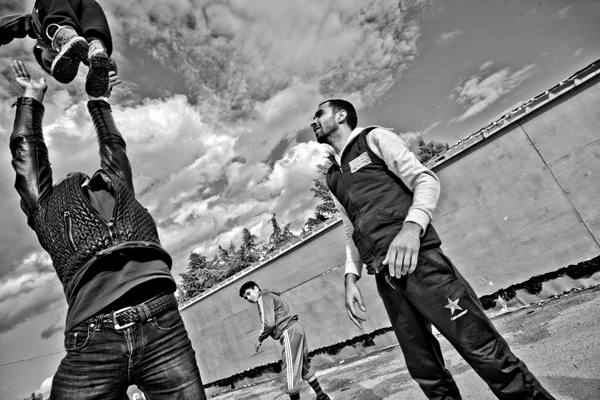
Isa: “My kids should not live this refugee life”
I am from Merdian near Aleppo. I have been here at the Karatepe camp near Mytilini
for 5 days. I entered through Izmir, Turkey. I got smuggled in with a rubber dinghy. I have 4 kids and a wife. They got a bit scared, but thank God we made it through. I know how to swim, so I was not so anxious, but I was worried about the children. The kids got sick on the sea. There were 60 people on the dinghy: 40 adults and about 20 kids. We got on the trip through a smuggler we found. He charged us 1000 dollars each. Kids were free. It took three and a half hours. We were fortunate that the sea was calm.
I left my country because of the terrible conditions. No water, electricity or food. And Basar al Asad was bombarding everywhere and everyone. May God not give him peace. He was killing everyone. Three people in my family died during the bombardments. During the war, some armed men took away my car. They took away our house. I do not want to lie to you and say that they were Asad's men. No, they were in uniforms, but they could have been from the military or from the resistance factions. In our neighborhood, there were the Free Syrian Army people also. It doesn't matter. The army and the opposition started the fights and I felt my children will be victims of the war. We lost everything and we left.
After the boat trip to this island, the people helping on the coast brought us here. It is ok. We get food and tents. The Red Cross is helping. Nothing special. It is just a place to stay. Right now, I am waiting for one of my brothers to bring my sick mother with him. They are still in Izmir. She couldn't have come on our trip because of health reasons. He will bring her by a real boat. We are waiting. Hopefully, they will come in a day or two and then we will all head for Germany or any country that takes us. We left the war, but we can start anywhere in Europe. I am not afraid, new language, new culture... But what can you do? Anything is better than war. My kids should not live this refugee life. Right now, they should be in school, learning and growing up with no worries. They destroyed the country totally, God damn them. They destroyed the future of our kids.
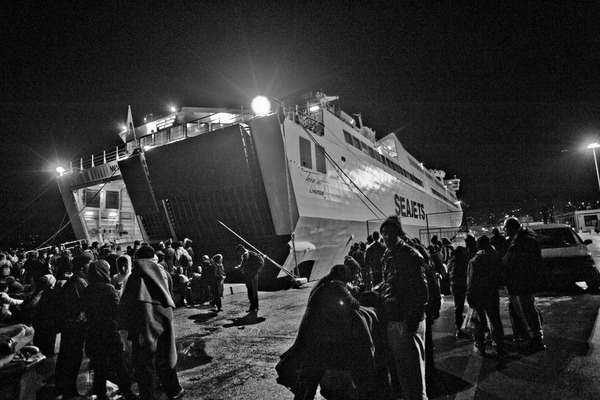
Ward: “Maybe the solution will be swimming back to Turkey”
I am from Damascus. Of course I left because of the war. I am 24 years old. Before the war, I had a good job and life. My father sold cars, but he lost everything during the war. Actually, my family did not want me to go to Europe. They said go to Turkey and see if you can find something there. If you can work there, you can help us and if you cannot find a job, we can help you from here, but stay in Turkey and don't go far. I went to Turkey and found it quite nice and beautiful. I tried to stay. Since I don’t know Turkish, I could not have found a job with Turks. So, I had found a job with a Syrian. But Syrian bosses are not like Turkish ones: the Syrians pay very little and take advantage of you. By profession, I am a barista and very good at it. I have a very prestigious international diploma. But what could I do? I started working at a Syrian restaurant, but as you know, in Syrian businesses there is a lot to do. The bosses always exploit you and make you do things that have nothing to do with your position. So, once I started the job, I found out that I had to do many things that had nothing to do with being a barista. For example, the owner wanted a new decoration, but he did not want to hire construction people. He did not want to pay. So, he ordered us to bring down a wall and put up a new one. I ended up working 2 days, out of my free time also, as a construction worker. I felt angry and so I complained saying that this is not my job. The woman at the restaurant office where I complained told me to take my pay and go. That was the end of the job at the Syrian restaurant. So, I was out of work for one week and started getting bored. Some of my friends who were planning to go to Germany illegally asked me why I was not coming with them. They said that Germany would be good for me. The Germans would look after me. At the same time, my mother was telling me, “Don't go to Germany. You have no business there.” But my friends played with my mind and I got smuggled with them to Mytilini. But the moment I stepped into the rubber dinghy with the smugglers, I regretted it. I started crying and telling them I want to step out. I wanted the dinghy to go back to the shore so I could get off. It was too late. We arrived in Greece and I found out that there was a camp here and people help the refugees, but I did not want to stay. I told everyone that I wanted to go back to Turkey. Then, they took me to a police station. They beat me up for no reason and kept me there for a complete day. No food or drink. Then, a police car came and took me to another station and kept me there till next morning. Then, they said I was free to leave. I had no money or papers. During the trip to Greece, the waves were very high. We had to throw our belongings into the sea to make the dinghy lighter. In any case, I left the police station and eventually someone on the street took me to the refugee camp in Karatepe. From there, I was taken to another camp called Bikpa. I stayed there for a couple of days and then I found out that some of my friends were in Karatepe. So I came back to this camp. The other camp was much better. It has been 15 days and I am not happy at all here. I want to go back to Turkey. My parents do not know that I am here. I really do not want to continue to Europe. I have any money even to go back to Turkey. But if I go back, maybe I can find a job with a Turk and I can save up some money and eventually I may bring a Syrian girl over and marry her in Turkey. Maybe the solution will be swimming back to Turkey. Maybe I will die and maybe I will survive. God is all Merciful.
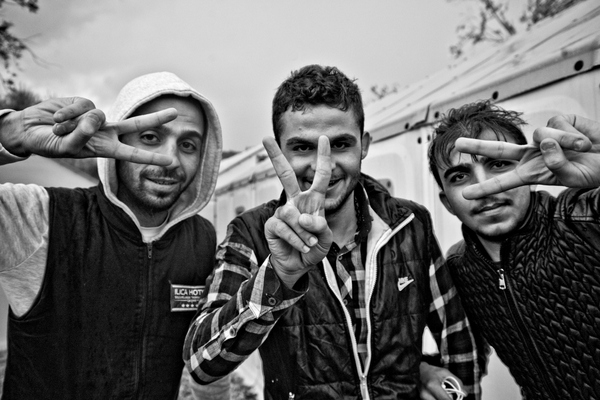
Tamer: “My country is gone, they destroyed it”
My name is Tamer. I was going to graduate from a high school in Halep, but because of the war, I ended up crossing the border from Kilis into Turkey illegally. I ran away to Izmir and lived there for 2 years. In Aleppo, I had been working for 7 years while I was a student. My specialty was to fix cell phones. But in Turkey, I worked as a construction worker for 50 liras a day. In the last period, things started becoming difficult: less work and money as well as the bad way they started looking at the Syrians. I have some friends in Europe who got in touch with me and encouraged me to plan to go near them, because they said things are good in Europe. I am still young and my parents are fine with living in Izmir so I thought, why not? I found a smuggler to take me to Greece by sea. I paid him 1000 dollars. We were supposed to be 35 people in the rubber dinghy, but we ended up being 55 to 60. He gathered us on the beach and because normally the refugees travel alone (the smugglers only organize the trip but do not accompany you), the smuggler asked who knew how to manage a boat. I had some marine experience in sailing and so I ended up being the captain of the dinghy. Apparently, the smugglers, after collecting their money, show the refugees how to manage the motor and on many trips, people drown. However, in this case, I knew how to skip the boat. I took the big group across the sea to Greece. Actually, there was another boat following us and 10 people from that boat drowned in the sea. But thank God, we were lucky and got to the other shore safely. We landed in the north near Skala and there were people helping the arriving boats. They are not smugglers. There were 2 cars from the Red Cross waiting there. They called for a bus and it brought us to this camp called Kara Tepe. (When we first landed, there were other people who took the boat apart. I think they take the pieces and sell them).
Here at the camp, there are only some cubicles and tents to sleep in. No water and no electricity. It doesn't really matter anymore, since I am staying here only because I am waiting for my relatives to arrive today or tomorrow from Turkey. Once they come, we will all go to Athens by boat and then to another place by bus. From there, we will go to Nemsa (Austria) which is supposedly near Germany (a two-day journey). It will all be illegally done and will cost a lot of money. Money from our pockets. I think it will be 210 euros in total. But what can you do? I mean, I am young and single. I can take the hard journey. All I want is safety and some hopeful future. My country is gone. They destroyed it. I feel sorry for people who have big families and kids. It is so difficult to do the journey with such a burden. But no choice. Look, single or not, we are all facing death. We all had to leave. Do not get me wrong. We did not leave just because of Asad. We all left because of the war.
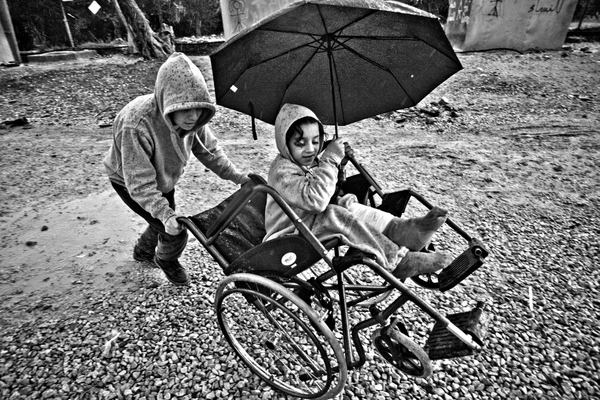
Yamen: “The war came and destroyed our dreams”
I am 19 years old and my name is Yamen; I am from Aleppo. It has been a year and a half that I ran away from Syria. Before leaving Aleppo, the Syrian army arrested me for no reason. I had not done anything and I had never joined any armed groups. They were suspicious of everyone and they were arresting people randomly. I was in captivity for one week during which they tortured me. They couldn’t have found anything against me, so they finally let me go. I came out in very bad health. The prison conditions were so bad that there was no food or water. We had to drink from the sewers. People dying under torture were thrown in the toilet areas and every time there were three or four dead bodies, they would collect them, put them in big bags and bury them. I saw all that and because of what I saw, I knew that I had to continue living no matter what. I didn't want to be like those corpses. Before I entered the prison, I was 70 kilograms. I came out very thin and weak, weighing only 40 kilograms. Coming out of that kind of torture would have made any person want to get a gun and take revenge. But I am a peaceful man and I have never thought that killing is a solution. I never want to have anyone's blood on my hands. As soon as I was free, I arranged for an illegal escape from Syria into Turkey through a smuggler who charged me 100 dollars. After a year and a half in Turkey, I crossed to Greece, again through the help of a smuggler. We came in a rubber dinghy. It cost me 1000 dollars. You are asking where I got so much money, since in Syria, that is a lot of money. My family owned a printing house and our business was good since we were serving big advertising firms. The war came and our business was destroyed. The building was bombed. I was a student at that time. It was Asad's mistake that the war started. For a long time, he did not want to do anything about all the weapons that were entering Syria from Turkey. The selling and smuggling of weapons had been going on for a long time before the war started. People were making big money. Asad knew about that, but he did not want to stop this lucrative business that was bringing big money to some of his close friends. So, once everything was destroyed because of the war, I said to myself that I have to go somewhere where I could continue my studies.
I left Syria alone and my brother joined me in Turkey later on and we came to Greece together illegally in a rubber dinghy. It has been very difficult so far, but we made it here and my hope is to reach any European country that is kind enough to accept me. I am still young and I want to be successful in my studies. But nothing is permanent. The war came and destroyed our dreams. My father died during the war, 2 years ago. All I have to care for is my poor mother. Maybe, when we get to live in a peaceful country, I can continue from where I left. I am not so happy that I have to go to Europe. They tell me that Europeans don't like Syrians. I do not care. If they want to kill me, let them kill me. And if they kick me out, I will go back to Turkey. God is all powerful and we have to accept our faith. Life continues. And if one day I get married and have children, I will tell them my story just like I am telling you now. I will tell them everything I saw. How a beautiful country was destroyed.
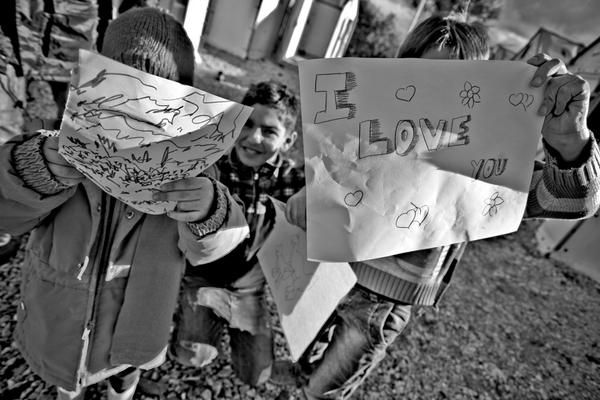
Mohamed: “There is nothing waiting for me in Europe”
You already know how simple life was in Syria. There was no problem and most people were comfortable. I had been living without big worries. I was working and leading a normal life. Then the war came and we were all shaken. Our lives became threatened. We started having big difficulties in surviving. So, I thought to go to another country for a while. I didn't want to go far and the closest was Lebanon. But Lebanon's ethnic problems are about to explode. Besides, the Lebanese do not like the Syrians. Then, I went to Jordan, but I saw that it had economic problems and was so poor that the refugees there were in worse condition than the ones in Lebanon. I decided to go back to my country. Not Damascus where I was born, but to Arif near Aleppo. It was close to the Turkish border. This was a time when the war in Syria was not that bad yet. But soon after I moved there, Asad’s army started bombarding the area. Life became very hard once again. The Syrian lira got devaluated and the dollar rose sky high. So I decided that I had to go somewhere more peaceful. Somewhere where I could work and lead a normal life. So I went to Turkey. I entered from Reyhanli side. No one asked me for any documents or passport. This was around the middle of 2011. I ended up in a camp in Maraş. I was surprised that the camps were so comfortable. Actually, it was better to stay in a camp instead of renting a house. There was electricity, hot water, food and even exercising area. You could even go to work outside the camp and come back to sleep there at night.
I stayed there about 3 months and then went to the Mersin where I worked two months and a half. Then I came back to Maraş and this time, I rented an apartment. I did not want to stay in a camp. I worked as a tailor. The pay was little, but life there was cheap. So I was managing fine. Besides, the people were quite good to me. They helped me a lot. I stayed a year and a half in Maraş and then I wanted to move on to something better. You know, at the beginning, it was about finding a way to survive, but after this first period in Turkey, I felt that doors were open for me. The government had helped me, given me a residence card. I was able to work and in those days, people had been good to Syrians like me. Survival alone was not enough for me. So I decided to go and try my luck in Istanbul. I went there and for 2 years, everything worked out quite well. I found a good job as a tailor with very good salary. I was able to pay my rent and send some money to my family. I even thought I can find someone to marry and lead a comfortable life. My boss was really good. He would have borrowed money from his friends to pay my salary whenever business was not good enough to pay me. Things were good. But then, I saw that many of my friends were going to Europe. Everyone was saying life is really good there. So I started thinking that maybe I should go too. One of my friends put me in contact with a smuggler in Izmir. I went to Izmir and the smuggler took me to an office where I paid for the cost of the trip to the office people. Once I arrived to Greece, the office would give the money to the smuggler. It cost me 1200 dollars. Anyway, I got on the rubber dinghy and in less than an hour, I arrived to this island. The trip was not dangerous at all. But from the moment I arrived here, I knew that I had made the wrong decision. I felt that if I go to Europe I would be cheated. Why? Because I am the kind of person with dreams and I work hard to build a life. Once I go to Europe, I have to wait 2 years until my papers are done. I am 27 now. Just sitting and learning a new language without working seems so strange to me. When I am 30, I will be able to look for a job and start working. I started having doubts. I felt there is a hidden agenda in all this. Why does Europe want to help me? After all, throughout the history, the Europeans have always exploited and harmed less powerful countries. Why would they want to be generous and human now? I started thinking there is some gain for them, otherwise they would not give you things for free all of a sudden. On the other hand, I started thinking about how easy my life in Turkey had been in the last 4 years: I had gone with nothing, learned the language, found a job and friends; and in addition, Turks had been very kind to me. Moreover, Turkey is an Islamic country and culturally, it is closer to our life in Syria. Europe is not the same. The family entity is not as strong. To start a family there would not be a good idea. It is a place just to study or travel. It is not a place to live in for a person like me. All my friends were saying that in Europe, the state looks after you and you can just sit and get paid. I think this is a myth. Why would the government want to give you money for nothing? In fact, you will have to work for every penny they give you. Besides, I am not a lazy person and I don’t want to sit and collect. In fact, even this whole thing about how kind the European governments are that they pay 400 euros per month for each of your children is something that I have started to question. I think they pay this money so that they can control the children the way they want. The state becomes the owner of the children.
I think I have already made up my mind to go back to Turkey instead of heading to Europe. There is nothing waiting for me in Europe.
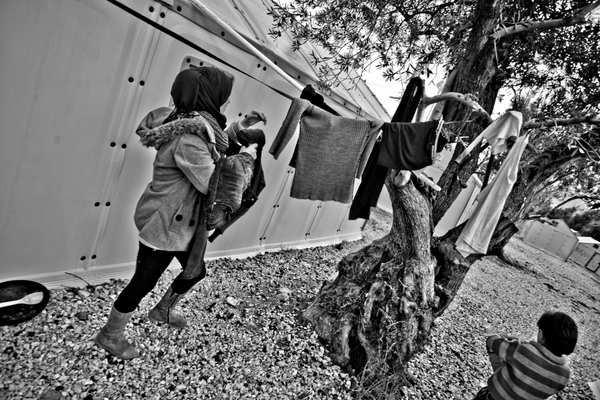
Sadi and Ragda: “They say that the one who has tried the sea is not afraid of anything”
We are from Jowbar near Damascus. Our journey has been difficult and it started almost 3 years ago. After the war started, first we moved to Lebanon. But Lebanon did not welcome us. The Lebanese hate the Syrians. On top of that, we are Sunnis and in Lebanon, the Shia’s hate for Sunnis is very prominent. We felt out of place there. No one wanted the Syrian refugees. With the money we had brought with us, we survived only for 7 months, because we spent it all thinking that the war would finish soon and we could return to our home. But the war went on and we had to find a job to survive. I, Sadi, am a tailor by profession, but I could not find anything. So I started to do physical work just to bring in some money to feed us. I worked at any job I could find. In the end, I found a job as a driver for a rich woman. Eventually, she opened a boutique and I started to work for her as a tailor too. I worked for hours to do both jobs for her. But it paid well and we survived in Lebanon for a while. But staying there was not a solution. We really felt we were hated. So after 3 years there, we started thinking we can go to Europe. So began our trip to Turkey. Everyone was going there to cross over to Greece illegally. We sold our car that we had brought with us from Syria and with the money we wanted to get to Greece. We found a smuggler in Izmir and we were promised to be smuggled to the Greek coast. On the day of the journey, we were taken to a place far from Izmir where 10 Rubber Dinghies were waiting. But because of the winds and the high waves, only 4 of the boats went on the trip. The sea was very dangerous. The weather was terrible and the water started to enter inside the boat. We had to throw away our belongings to make the boat lighter. We were very frightened. Then, at one point, we stopped completely. We were stuck for two and a half hours. The motor of the dinghy was dead and would not start. It was all wet. We almost gave up hope but then the Greek coast guard came to rescue us. They tied our boat to their ship and pulled us to the shore. In the end, our rubber dinghy trip had lasted four and a half hours instead of the 30 minutes it was supposed to be. When we arrived on the beach, the first thing the people who were helping us did was to undress my daughter to change her into dry clothes. She was totally naked and at that moment, my daughter started crying so much. She was crying with so much pain. I think she had been feeling all the fear and pain throughout our hard journey and she had kept it inside her. She was oppressed by all the cold, wetness, hunger and fear. She could not hold it in any more. She let it go and I was very happy that she started crying. I think she would have blown up if she had not.
The Red Cross people gave us dry clothes to change into. We were all wet. Then, they took us to a small camp just to rest for a few hours and finally some busses took us to Moria which is another camp close to here. It was very crowded. But at least we got some food there. Soon after, a couple of European people came and took us to this camp. It is ok here, but we have no money at all. We have been here for 7 days, but we are desperate without money. And there is no one to get in touch with so they can send us some money. Our only hope is the Red Cross. If we can get to the border of Macedonia, the Red Cross will sponsor us to go to one of the European countries. Let’s see. We have to wait. But it is difficult. We can go without food, we are adults. But what about our kids? We have to get them food and drink whenever they need. They are young. They would not understand. Our only concern is their future. The kids are supposed to be in school right now. They need to get educated. We want them to be equal normal human beings: eat, dress and enjoy life like everyone. But at the moment, when I think about it, I feel that the war changed our life completely. I love Syria and if someone loves his country and is forced to leave it, he will feel like a fish out of water. I am like that fish. I am suffocating slowly because of the desperate situation we have in front of us. The war destroyed everything. Do you know that we come from a place called Jowbar. And Jowbar had been impossible to conquer for 3 years. Asad’s army had been trying and trying but the resistance in Jowbar is so strong that the army has failed.
We are Sunnis as I said. Before the war, we were living under the Alevi regime, but we had no problems. I had never even had to deal with the law or police. We just lived our lives without anyone bothering us. We used to have lands, cars and factories. All of a sudden war came and nothing is left: both the army and the resistance armies swallowed all that we had. They did not leave anything for us. The poor became rich overnight and the rich became richer. And in the last 5 years, our situation started going downhill until we arrived to this point of being refugees in a camp in a foreign country with no clue about what tomorrow will bring us. But by God, we are ready to go on. We are not afraid of anything. Our children deserve a humane life and so we have to go on until that happens. Fear? What is fear? They say “The one who has tried the sea, is not afraid of anything.”


